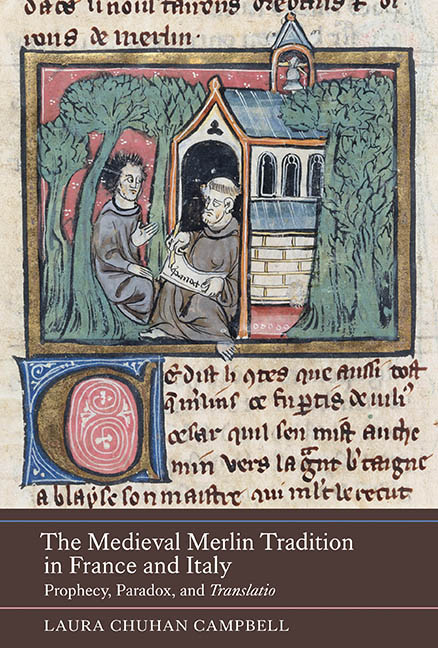Book contents
- Frontmatter
- Contents
- Miscellaneous Frontmatter
- Acknowledgements
- List of Abbreviations
- Introduction
- 1 Sympathy for a Devil? Merlin's Conception according to Robert de Boron and Paulino Pieri
- 2 Death of the Author: Merlin's Imprisonment by the Dame du Lac
- 3 Beyond the Limits of Interpretation: Rewriting Prophetic Discourse in the Estoire de Merlin and the Suite du Merlin
- 4 ‘Ce dit Merlin’: Open and Closed Prophecies in the Italian Merlin Tradition
- Conclusion
- Appendix 1 Chronology of Primary Texts
- Appendix 2 Summaries of the Principal Texts Discussed
- Bibliography
- Index
- Miscellaneous Endmatter
Conclusion
Published online by Cambridge University Press: 23 August 2019
- Frontmatter
- Contents
- Miscellaneous Frontmatter
- Acknowledgements
- List of Abbreviations
- Introduction
- 1 Sympathy for a Devil? Merlin's Conception according to Robert de Boron and Paulino Pieri
- 2 Death of the Author: Merlin's Imprisonment by the Dame du Lac
- 3 Beyond the Limits of Interpretation: Rewriting Prophetic Discourse in the Estoire de Merlin and the Suite du Merlin
- 4 ‘Ce dit Merlin’: Open and Closed Prophecies in the Italian Merlin Tradition
- Conclusion
- Appendix 1 Chronology of Primary Texts
- Appendix 2 Summaries of the Principal Texts Discussed
- Bibliography
- Index
- Miscellaneous Endmatter
Summary
In this book, I have argued that translation, broadly defined, is central to the character of Merlin in the French and Italian Arthurian corpus. At the same time, I have maintained that the character of Merlin exemplifies a number of the features of translation as it was conceived in the Middle Ages. Merlin's activities and speech acts within the different narratives are comparable to translation, in that they constitute a conversion between two semiotically incompatible systems: his supernatural omniscience on the one hand, and the finite logic of the narrative on the other, which is bound by the rules of earthly time and language. I have compared this conversion to the medieval topos of translatio, which is envisaged as a displacement of one language and cultural context by another. Although it is most often used to describe the transfer of knowledge and power from the ancient world to the medieval present, translatio also functions in the more abstract sense of a transposition of meaning, which is comparable to the rhetorical function of a metaphor. Merlin's prophetic discourse displaces knowledge that is infinite and atemporal onto a limited, temporally-governed linguistic system, which can only support it in a fragmented form – just as vernacular versions of classical texts had to adapt and omit parts of the text that would not be acceptable or comprehensible to a medieval reader.
At the same time, this book has demonstrated that the transmission of the story of Merlin from Latin to French and Italian vernaculars offers an alternative model of medieval translation, and one that would not have corresponded necessarily to the medieval concept of translatio. As we have seen, translation between vernaculars does not work on the basis of displacement and substitution, which governs the logic of translatio studii and translatio imperii from classical literature. French and Italian dialects and texts were permeable, and not mutually exclusive; the possibilities for grammatical and morphological combinations between varieties of different vernaculars meant that linguistic displacement was a choice and not an obligation. The ethical and hierarchical relations of translatio imperii did not particularly apply to French and Italian cultures on the whole – Francophone texts circulated because they were popular and filled a generic niche, not because they were regarded as superior texts.
- Type
- Chapter
- Information
- The Medieval Merlin Tradition in France and ItalyProphecy, Paradox, and Translatio, pp. 175 - 178Publisher: Boydell & BrewerPrint publication year: 2017

